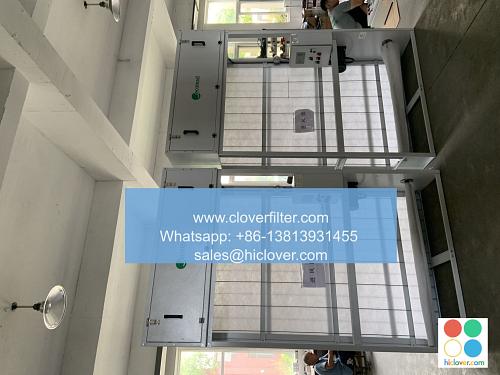Calgary Food Processing Workshop: Troubleshooting Common Issues with Automatic Roll Air Filters

The Calgary Food Processing Workshop is a premier event that brings together industry experts and professionals to discuss the latest trends and challenges in food processing. One of the key topics of discussion at the workshop is the use of automatic roll air filters in food processing facilities. These filters are designed to remove airborne contaminants and improve air quality, but they can be prone to common issues that can affect their performance. In this article, we will explore some of the common issues that can occur with automatic roll air filters and provide troubleshooting tips to help food processors optimize their use.
Automatic roll air filters are designed to automatically advance a new filter media as the old one becomes dirty, reducing the need for manual maintenance. However, issues such as improper installation, poor maintenance, and clogged filters can reduce their effectiveness. For example, if the filter is not installed correctly, it may not be able to capture airborne contaminants effectively, leading to reduced air quality. Similarly, if the filter is not regularly cleaned and maintained, it can become clogged, reducing airflow and increasing energy costs.
To troubleshoot common issues with automatic roll air filters, food processors should start by checking the filter installation and maintenance records. They should ensure that the filter is installed according to the manufacturer’s instructions and that it is regularly cleaned and maintained. They should also check the filter media for signs of wear and tear, such as tears or holes, and replace it as needed. Additionally, they should ensure that the filter is properly sealed to prevent air leaks and that the airflow is not restricted.
Another common issue with automatic roll air filters is the buildup of static electricity, which can cause the filter media to become charged and attract airborne contaminants. To prevent this, food processors can use anti-static sprays or treatments on the filter media. They can also ensure that the filter is properly grounded to prevent static electricity buildup.
Clogged filters are another common issue that can occur with automatic roll air filters. To prevent clogging, food processors can use pre-filters to capture larger airborne contaminants before they reach the automatic roll air filter. They can also ensure that the filter is regularly cleaned and maintained, and that the airflow is not restricted. Additionally, they can use filter cleaning systems, such as compressed air or vacuum cleaners, to remove dirt and debris from the filter media.
In addition to these troubleshooting tips, food processors can also take steps to prevent common issues with automatic roll air filters. For example, they can ensure that the filter is properly sized for the application, and that it is installed in a location that minimizes airflow restrictions. They can also ensure that the filter is regularly inspected and maintained, and that any issues are addressed promptly.
Conclusion: Automatic roll air filters are an important part of food processing facilities, but they can be prone to common issues that can affect their performance. By following the troubleshooting tips outlined in this article, food processors can optimize the use of their automatic roll air filters and improve air quality in their facilities. Regular maintenance, proper installation, and prompt issue resolution are key to preventing common issues and ensuring that automatic roll air filters operate effectively.
FAQs:
- Q: What are the benefits of using automatic roll air filters in food processing facilities?
- A: Automatic roll air filters can improve air quality, reduce airborne contaminants, and minimize the risk of product contamination.
- Q: How often should automatic roll air filters be cleaned and maintained?
- A: The frequency of cleaning and maintenance will depend on the application and the level of airborne contaminants. As a general rule, filters should be cleaned and maintained at least every 1-3 months.
- Q: What are the consequences of not properly maintaining automatic roll air filters?
- A: Failure to properly maintain automatic roll air filters can lead to reduced air quality, increased energy costs, and a higher risk of product contamination.
- Q: Can automatic roll air filters be used in conjunction with other air filtration systems?
- A: Yes, automatic roll air filters can be used in conjunction with other air filtration systems, such as HEPA filters or activated carbon filters, to provide a comprehensive air filtration solution.

